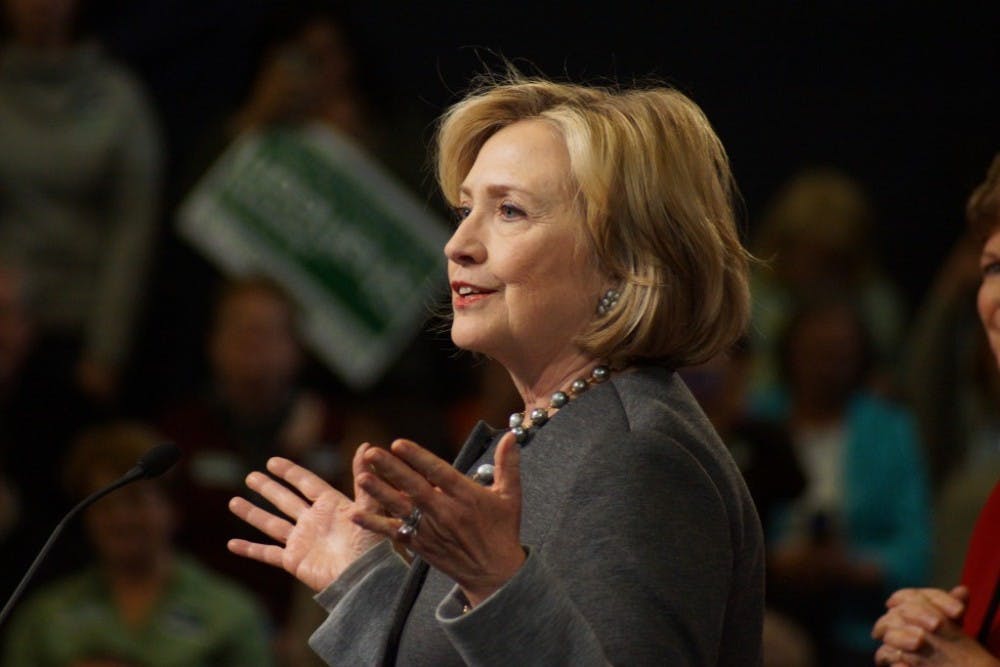Hillary Clinton and Donald Trump had impressive showings on Super Tuesday. Each candidate won seven of the 11 states that went to the polls on March 1. Trump and Clinton won Alabama, Arkansas, Georgia, Massachusetts, Tennessee and Virginia in their respective primaries. Trump also won Vermont and Clinton, Texas.
In the Republican race, Ted Cruz (Texas) won Oklahoma, Alaska and Texas. Marco Rubio (Fla.) had his first victory of the primary season in Minnesota.
Bernie Sanders had victories in Colorado, Minnesota, Oklahoma and Vermont. He lost to Clinton by one percent in Massachusetts.
President of Hopkins College Republicans Nitin Nainani described Trump’s performance as solid but underwhelming.
“While I would say that Donald Trump overall had a very good night, I am a little underwhelmed by his performance,” Nainani said. “As someone from Virginia, I expected him to win the state by healthier margins than he ended up doing. I also expected him to do better in Vermont, Oklahoma and Arkansas.”
Nainani explained that for Republicans seeking a Trump alternative, his poor performance in closed primaries bodes well.

“The other big thing was that he is underperforming in closed primaries, and most of the remaining contests are closed primaries,” he said. “That should give some hope to Republican voters who don’t want to have Trump as the nominee.”
Freshman Lucas Feuser, who identifies as a Democrat, thought Trump’s performance indicates a likely Trump nomination.
“As of now it looks very likely that the nomination is going to go to Trump,” he said.
The other solid performance of the night came from Ted Cruz. It was a must-win night for Cruz, since a loss in his home state would have ended his campaign.
Rubio’s campaign ended the night with a victory in Minnesota. According to Nainani, Rubio made a poor showing with his inability to reach the threshold for delegates in some states and his campaign’s pre-Super Tuesday hype.
“One of the reasons why it was a not-so-great night for Rubio in particular was he barely made the threshold in some states, and outright missed it in some states and that cost him at least a handful of delegates, more than his loss in Virginia ever did,” Nainani said. “There was a lot of exasperation last night, because Marco Rubio — until very late into the night with Minnesota — had not won a state yet. His campaign, for whatever reason, raised expectations that they would win 3-4 states.”
Nainani explained that one of the reasons for Rubio’s lackluster performance is a growing split within the Republican party — a split some people argue has been due to Trump.
“Trump’s candidacy has proven that there is a divide between the expectations of Republican voters and Republican elites. I think that this is very much in play here. A brokered convention would make that clear, and it is something that should be made clear,” Nainani said. “I regret that it had to be elevated by Trump’s candidacy, but Republicans cannot pretend that this is not an issue any longer. Who knows how this ends up turning out, but it could be healthy moving forward.”
Sophomore Abby Annear, who considers herself a Republican, agrees that the party is divided, but stresses that this fission has been a force long before Trump.
“People say that Trump is the reason that the Republican Party is fractured. What they don’t realize is that it’s been fractured for a very long time,” Annear said.
Feuser, however, stressed that the Trump phenomenon is international and not limited to domestic U.S. politics.
“When people look back at this from 10 to 20 years, they are going to see that Trump is exactly like Le Pen in France, he’s exactly like the NPD in Germany. He is exactly like all these parties and leaders that are already in power or gaining power,” Feuser said. “He is less a symptom of what is going on in the GOP, and more evidence of something bigger that is happening — a shift in Western society as a whole. I think the real splintering within the GOP is between Cruz and Rubio.”
Trump’s dominating lead has many wondering why other candidates are continuing to run.
Annear argues the best chance for Cruz or Rubio is if the other candidates drop out.
Nainani takes a different stance, claiming a brokered convention is the best bet for an establishment candidate to win.
“In regards to can they win, I think that at this point the strategy is to just block Trump from getting 1237 delegates, which is what he needs to be the nominee,” Nainani said. “That strategy relies on Kasich winning Ohio and Rubio winning Florida.”
Even though Sanders lost Super Tuesday, Jacob Kravetz, a graduate student and Sanders supporter, felt Sanders performed as expected.
“Everyone knew that the South was going to go to Hillary Clinton,” he said. “Am I disappointed by those margins? Yeah. Given that delegate counts are proportional, it certainly really sucks, especially in a place like Texas. But these are Deep South, deeply Republican areas. In terms of general electability it didn’t really mean anything — we’re never going to win those.”
Annear thought Bernie’s performance was surprising considering his base of supporters.
“It’s college students and young professionals who are known for not being the most active in political life,” she said. “Yes, they’ll go to protests and rallies, but will they actually go to the ballot box?”





